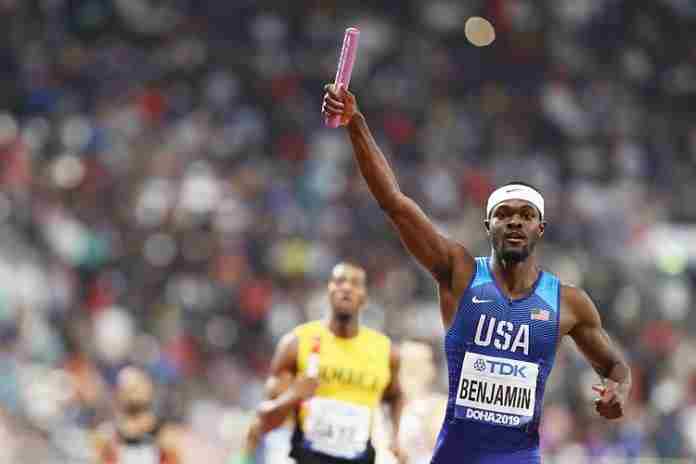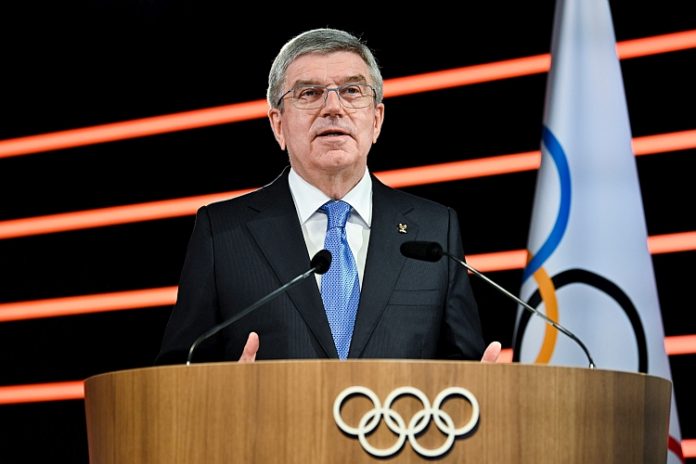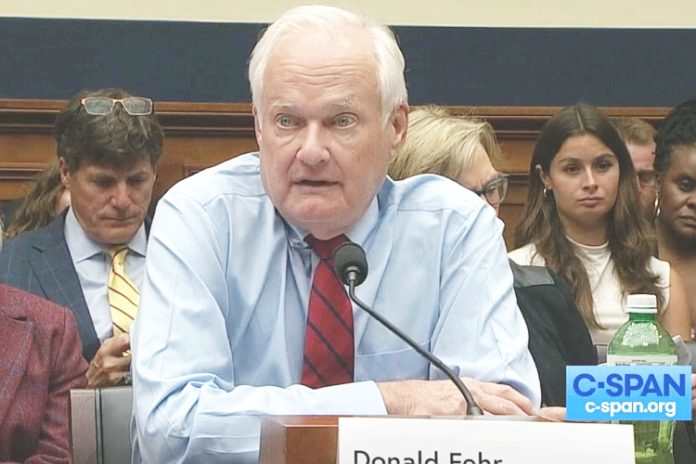★ The Sports Examiner: Chronicling the key competitive, economic and political forces shaping elite sport and the Olympic Movement.★
★ To get The Sports Examiner by e-mail: sign up here! ★
≡ THE 5-RING CIRCUS ≡
1. Report: Cricket to be proposed as added sport for LA28
2. U.S. crushes Italy in FIBA World Cup quarters, 100-63
3. Spain’s RFEF apologizes “to the football world,” fires Vilda
4. Story: Qatar paid $330 million to get 2022 FIFA World Cup
5. Only 35% of U.S. tracksters were better at Worlds than Nationals
● A British newspaper report said that cricket would be submitted by the LA28 organizers as an added sport for 2028, as long as flag football could also be added? Behind all of this are questions about added revenue potential for LA28 from cricket-crazy nations such as India and Pakistan.
● At the FIBA World Cup now rushing to the finish in the Philippines, the U.S. stomped Italy, 100-63, in its quarterfinal while Lithuania – which beat the U.S. on Sunday – was itself eliminated from championship contention by Serbia, 87-68!
● The Royal Spanish Football Federation’s Acting President posted a letter of apology for the actions of suspended President Luis Rubiales, and also fired women’s national team coach Jorge Vilda, less than three weeks after having won the FIFA Women’s World Cup.
● A detailed online story which included data from court filings showed that Qatar’s effort to win the right to stage the 2022 FIFA World Cup was successful, thanks in significant part to payments to voters totaling $330 million from a Qatar National Bank account in London.
● A TSX analysis of the results of U.S. athletes at the 2023 World Athletics Championships showed that only 35% of the American team achieved better results in Budapest than they did at the U.S. national championships the month prior. That may not sound great, but it’s actually pretty good, but the year-after-year championship load is being called into question as unsustainable.
● World Championships: Rowing (2023 Worlds underway) = Weightlifting (Vietnam and China win on day 2; U.S. gets first medal) ●
● Panorama: Winter Games 2030 (details emerge on Swiss national hosting plan) = International Olympic Committee (new ESports commission announced) = Germany (Center for Safe Sport project roadmap released) = Aquatics (Russians call World Aquatics entry regs “absurd”) = Athletics (Mexico Marathon disqualifies 11,000 for course cutting?) = Cycling (U.S.’s Kuss leads La Vuelta after stage 10 time trial) = Football (FIFA monitoring Mali federation chief now indicted) = Volleyball (souvenir beach Worlds ball now available) ●
1.
Report: Cricket to be proposed as added sport for LA28
A Monday report on The Times (London) said that cricket would be proposed by the LA28 organizing committee for inclusion as an added sport for the 2028 Olympic Games.
However, the addition of cricket would come with an agreement to also add Flag Football, a non-contact version of American Football championed by the National Football League.
Baseball and softball are also expected to be asked for by LA28, with the details slated to be released on Friday during a news conference at the close of an International Olympic Committee Executive Board meeting.
Cricket has only been on the Olympic program once, in 1900 in Paris. Flag Football has never been in the Games, but American Football has been a demonstration sport in St. Louis in 1904 (sort of) and was a demonstration sport at the 1932 Games in Los Angeles between western and eastern all-star teams, that drew 41,643 at the Los Angeles Memorial Coliseum.
The International Cricket Council (ICC) has pitched a six-team tournament for men and women in the compact Twenty20 (T20) format, which includes one inning for each team, with a maximum of 20 overs per inning.
A Sportico.com story in May reported that the ICC projected that if T20 were included for 2028, that television rights for India alone would rise from the reported $12 million now for Paris 2024 to $201 to $268 million for Los Angeles, and that the organizing committee would benefit from that. Of course, the IOC owns all television rights to the Games, and would have to agree to share increased from markets such as India, Pakistan and others.
The Los Angeles 2028 organizers have already agreed on a 28-sport program, with boxing, modern pentathlon and weightlifting possibly to be added at the IOC’s discretion. That’s a potential total of 31 sports and if baseball + softball, cricket and flag football were added, that’s 34, all against a hard cap of 10,500 athletes. That means that for these added sports, the number of athletes in other sports would have to be reduced.
All of this is expected to become clear on Friday, with the IOC scheduling a news conference at 5:30 p.m. Central European Time (11:30 a.m. Eastern), available live on the IOC’s YouTube channel.
2.
U.S. crushes Italy in FIBA World Cup quarters, 100-63
Crazy things happen in tournaments, like the FIBA men’s World Cup ongoing in the Philippines.
On Sunday, the U.S. was out-fought, out-played and lost to Lithuania, 110-104, in their final game of the second group stage, with both teams moving on to the quarterfinals.
On Tuesday, the U.S. crushed Italy, 100-63, to move on to the semifinals, while Serbia stomped Lithuania, 83-67 and eliminated them from the championship bracket. What?
The opponents for the Americans and Serbs will be determined on Wednesday, when Germany and Latvia meet (with the U.S. next) and Canada plays Slovenia, with the winner getting Serbia.
¶
The U.S. knew it had to play better from the start against Italy, after getting drubbed by Lithuania, 31-12, in the first quarter. So this time, it was the U.S. in charge with a 24-14 lead after the quarter and then a 22-10 second quarter to move to a 46-24 halftime lead. The Italians were held to just 24% shooting from the field, including 5-17 in the opening quarter.
Guard Tyrese Haliburton (Pacers) said defense was the key:
“Teams aren’t going to miss by themselves. Once they see the first couple go in, they play with a lot of confidence and we obviously saw that with Lithuania. We just wanted to set the tone from the jump and make them play at our pace because nobody plays better at our pace than us.”
He had a team-high five assists and made six three-pointers on the way to 18 points off the bench, second-best on the team to 24 from forward Mikal Bridges (Nets), on 8-11 shooting, including 4-6 from three-point range. Reserve guard Austin Reaves (Lakers) had 12, as the U.S. shot 53.7% for the game, 47.2% from the three-point line and out-rebounded Italy, 51-33.
The Italians were led by forward Simone Pontecchio (Jazz) with 18, but shot only 30.7% from the field and just 7-38 from three-land.
A 13-0 U.S. run in the second quarter effectively put the game away, and then a third-quarter scoring explosion – 37-20 – gave the Americans an insurmountable 83-44 lead going into the fourth.
¶
The Lithuanians came in as one of only two undefeated teams left – Germany is the other – and had a 25-24 lead on the Serbs – who had lost to Italy – at the end of the quarter. But a 25-13 second quarter gave the Serbs a 49-38 halftime lead, which was extended to 73-55 at the end of three, on the way to a 87-68 victory.
Where the Lithuanians had flummoxed the U.S. with crisp passing, three-point shooting and interior rebounding, that didn’t work against the Serbs. Lithuania shot only 42.9% for the game and was only 9-28 from the three-point line, compared to 55.0% shooting for Serbia and 63.2% on shots inside the three-point line. Moreover, Serbia won the rebounding battle, 33-28, holding Lithuania to just eight offensive rebounds.
Against the U.S., Lithuania shot 52.8% for the game, 56.0% from three and had 18 offensive rebounds and 43 in all.
The Serbs got 21 points from Hawks guard Bogdan Bogdanovic on 9-13 shooting, 17 points from reserve center Filip Petrusev (76ers) and 11 from guard Stefan Jovic. Lithuania had four in double figures, led by forward Tadas Sedekerskis (14) and guard Rokas Jokubaitis (13).
Italy and Lithuania aren’t done yet; they will now move to the bracket for places 5-8; neither will have qualified for Paris 2024 from this tournament and will have play in the spring for an Olympic berth.
3.
Spain’s RFEF apologizes “to the football world,” fires Vilda
The Royal Spanish Football Federation (RFEF) went on the offensive on Tuesday, first issuing a public letter of apology from Acting President Pedro Rocha, and then firing national women’s team coach, Jorge Vilda, just 16 days after his club won the FIFA Women’s World Cup in Australia.
Rocha’s 12-paragraph letter included a direct reproach of elected President Luis Rubiales, also noting that investigations are continuing at multiple levels:
● “The Royal Spanish Football Federation, through its President, Mr. Pedro Rocha, considers it is essential to present the most sincere apologies to the football institutions (FIFA, UEFA, FAs), the players, especially the players of the Spanish National Football Team and the English National Football Team, all stakeholders involved in football and the fans around the world, for the totally unacceptable behavior of its highest institutional representative during the final of the FIFA Women’s World Cup 2023 and in the moments that followed.”
● “The RFEF wants to convey to the whole of society and to the whole of world football its deepest regret for what has happened, which has tarnished our national team, our football and our society.”
● “Winning the World Cup was one of the proudest moments in the history of the Spanish Federation and one of the most important moments of Spanish sport and of women’s football. The actions of Mr. Rubiales both at that moment and in the following hours are not acceptable under any circumstances and for this reason the RFEF immediately withdrew from its website all those inappropriate and meaningless communications that did not value what was achieved by the National Team and did not take into account the statements of the player about these facts.”
Rocha pledged further cooperation with the Spanish authorities and FIFA:
“The RFEF is providing all the documentary and administrative support required by both disciplinary bodies in order to have a definitive resolution as soon as possible to repair the damage caused.”
A formal review of the internal practices and procedures of the federation has been initiated as well.
A separate announcement confirmed the dismissal of Vilda as the women’s national team coach and sports director, explaining:
“The Royal Spanish Football Federation, in one of the first renewal measures announced by President Pedro Rocha, has decided to part ways with Jorge Vilda’s services as the sports director and head coach of the women’s national team, a position he took on in 2015. The RFEF appreciates his work leading the national team and his role as the highest sports authority for the women’s teams, as well as the successes achieved during his tenure, culminating in the recent World Cup victory. We highly value his impeccable personal and sporting conduct, as he has been a key figure in the significant growth of women’s football in Spain. Throughout his extensive tenure, Vilda has been a promoter of respect and sportsmanship values in football.”
There was no condemnation of Vilda in the statement, in view of his multiple successes on the field, but as a supporter of Rubiales and his central position in the walk-out of 15 players from the national squad in 2022, his position had become untenable. Not all of the complaints of the 15 were specifically about Vilda, but of the team’s overall environment, and was met with a stern rebuke from Rubiales and the RFEF. Some changes were eventually made and eight of the 15 agreed to be available to play in the Women’s World Cup, and three eventually did.
Rubiales, meanwhile, continues to fight on, with the FIFA and Spanish governmental inquiries in process.
4.
Story: Qatar paid $330 million to get 2022 FIFA World Cup
A lengthy story from the online magazine Tablet details how the Qatari government managed a successful effort to win the final vote to host the 2022 FIFA World Cup:
“Qatar National Bank (QNB) documents, included in a filing made by a Philadelphia-based policy organization fighting a subpoena from a former Qatari-hired American lobbyist, reveal the secret cost of Qatar’s bid to put on the biggest sporting event on Earth. The documents record over 210 million pounds in payments, then worth over $330 million, to members of the FIFA committee who voted on which country would host the 2018 and 2022 tournaments in late 2010. They list specific names, bank account numbers, and amounts of money received.
“The record of payments comes in the form of a balance sheet for an account at QNB belonging to the Qatar Diplomatic Mission in London. Between February of 2009 and December of 2010, the account paid over 350 million pounds ($553 million) to some 22 individuals, with the majority of the money going to 14 members of the FIFA executive committee, the body which chooses the host countries for the organization’s flagship event. Some of the payments went to close family members, although a majority of them were direct to committee members.”
Qatar was selected over Australia, Japan, South Korea and ultimately, the U.S., in the fourth round of voting, 14-8, by the 22-member FIFA Executive Committee on 2 December 2010. Qatar received 11, 10, 11 and 14 votes in the four rounds of balloting.
According to the story, the biggest payments went to Russian Vitaly Mutko, the country’s sports minister from 2008-16 and the head of the successful Russian bid for the 2018 FIFA World Cup, later Deputy Prime Minister from 2016-20. He received a payment of £46.0 million (then $72.6 million U.S.) In February 2019 and £21.5 million (then $34.0 million U.S.) on 20 December 2010, just 18 days following Qatar’s selection as the 2022 World Cup host.
Qatar spent, by its own account, $8 billion on the ultimately-successful 2022 World Cup, with many billions more in public construction works which were completed between 2010-22.
5.
Only 35% of U.S. tracksters were better at Worlds than Nationals
The U.S. team was once again dominant at the World Athletics Championships in Budapest (HUN), winning 29 medals to 12 for next-closest Jamaica and scoring 277 points in the placing table, vs. 139 for Jamaica and 112 for Kenya.
And yet, a TSX analysis of performances shows that only 35% of the U.S. team performed better at the Worlds than at the USA Track & Field Nationals in Eugene, Oregon.
This is not unusual, but it points out the difficulty faced by American athletes, trying to make the Worlds team amid a super-competitive environment at home. The statistics, showing the number of athletes whose performance in their final round of competition at the Worlds was better (or the same) as their final-round performance in Eugene:
Men’s events:
● 35.0%: Running (10.5 out of 30)
● 29.6%: Field/Dec. (8 of 27)
● 100%: Walk (1 of 1)
● 33.6%: Total (19.5 of 58)
Women’s events:
● 36.7%: Running (11 out of 30)
● 37.5%: Field/Hep. (9 of 24)
● 0.00%: Walk (0 of 0)
● 37.0%: Total (20 of 54)
Totals:
● 36.7%: Running (21.5 out of 60)
● 37.5%: Field/Multi (17 of 51)
● 100%: Walk (1 of 1)
● 35.3%: Total (39.5 of 112 )
In comparison to the Tokyo Olympic Games in 2021, the U.S. did better in 2023 – a lot better – than the Olympic squad that won 26 medals (7-12-7):
● 31.3%: Men (17.5 out of 56 better at Games than Trials)
● 21.9%: Women (12.5 out of 57)
● 26.6% : Total (30 out of 113)
The U.S. in Budapest also did very well – overall – in comparison to the Rio 2016 Olympic team, competing in a home hemisphere, that won 32 medals (13-10-9):
● 42.1%: Men (24 out of 57 better at Games than Trials)
● 23.7%: Women (13.5 out of 57)
● 32.9%: Total (37.5 out of 114)
So, what can we take from this? One is to look at the timing of the U.S. nationals (or Olympic Trials) vis-a-vis the World Champs or Olympics:
● 2023: 41 days between U.S. selection and Worlds
● 2021: 33 days between U.S. trials and Olympics
● 2016: 33 days between U.S. trials and Olympics
(The 2022 Worlds in Eugene, being a home-country meet is ignored as not comparable.)
No one knows what the situation will be for 2024, as while the dates for Paris 2024 are fixed, the dates and location of the 2024 U.S. Olympic Trials have not been announced!
Then again, what works in terms of days between the selection meet and the Worlds or Olympics might not matter, in view of the current workload. Said U.S. 400 m hurdles star Rai Benjamin, the Olympic silver winner in 2021 and Worlds silver and bronze winner in 2022-23, after this year’s U.S. Nationals:
“It’s hard to maintain this level of competitiveness, and running fast. You’ve got to see that it’s taking its toll on everyone. We’ve had championships back-to-back [2021-22-23]; dudes are hurt; it’s hard to do this, at this level, and keep everyone happy.
“Everyone’s like, ‘hey, you guys need to compete against each other,’ and it’s just like, dude, you can’t peak, every single year, especially U.S. athletes, where, we don’t have the discretion of saying, like, ‘yeah, Rai, we like you, you’re on the team, man.’
“That does not happen here. So, you have to come out here [to nationals], peak here, peak again in August, and then we have turn around next year and do the same thing again? It’s impossible.”
Battling injuries for much of the year, Benjamin won the U.S. title again with a spectacular 46.64, then ran 48.35 (heat), 47.24 (semi) and 47.56 in the final at the Worlds for bronze. And there will be major championships for the next two years in 2024 (Olympics) and the 2025 Worlds in Tokyo.
So, what about those who didn’t have to compete in Eugene, as their Worlds entry was assured? That would be the 11 Americans who were defending champions (10) or a Diamond League winner (1). They certainly did not all meet with success:
● 1 of 4 men got their season’s bests at Worlds (25%)
● 3 of 5 women got or equaled their season’s best at Worlds (60%)
● 2 did not compete at Worlds due to injury or training issues
So, that’s four of nine (44.4%) who got a season’s best or equaled it in Budapest after not having to compete in Eugene: congratulations to Grant Holloway, Athing Mu, Katie Moon (=) and Chase Ealey, plus an honorable mention to Ryan Crouser, whose 23.51 m (77-1 3/4) Worlds winner was just short of his world-record throw of 23.56 m (77-3 3/4) in May.
Getting a bye, then, is not necessarily the answer either.
¶
In terms of global balance, an important measure for World Athletics, retired USATF performance chief Duffy Mahoney broke down the World Championships medals by region:
● 55: (20-18-17) North & Central America + Caribbean
● 47: (16-15-16) Europe
● 26: (9-8-9) Africa
● 9: (3-2-4) Asia
● 6: (1-2-3) Oceania
● 5: (1-3-1) South America
In terms of points for places 1-8, a much better indicator of depth:
● 622: Europe (28 nations scored)
● 574: North & Central America + Caribbean (13)
● 301: Africa (12)
● 132: Asia (10)
● 66: South America (6)
● 65: Oceania (2)
Europe’s demise as a track & field power has been widely written about, but at least based on Budapest, is hardly the case.
≡ WORLD CHAMPIONSHIPS ≡
● Rowing ● The 2023 World Rowing Championships are underway in Belgrade (SRB). Finals in the Paris 2024 Olympic classes will be held on Saturday and Sunday.
● Weightlifting ● Asia swept the top places at Wednesday’s events at the 2023 World Weightlifting Championships in Riyadh (KSA), with the U.S. also getting its first medal.
In the men’s 55 kg class, Vietnam went 1-2 with Lia Gia Thanh sweeping the Snatch, Clean & Jerk and total at 123-146-269 kg, ahead of teammate Ngo Son Dinh, who lifted 117-144-261 for the silvers. Thai Thada Somboon-uan won the bronze in all three phases, at 116-143-259 kg.
It’s the second gold ever for Vietnam in a weightlifting Worlds, after Kim Tuah Thach in the men’s 56 kg class in 2017.
China’s Huihua Jiang repeated as champion at 49 kg, lifting 95-120 (world record)-215 kg (world record) to win all three stages of the event, ahead of teammate and 2018 champ Zhihui Hou (95-116-211 kg). Jiang now owns the Worlds golds, from 2019-22-23, and Hou won her fourth Worlds medal (1-2-1).
China has now won this class in 12 of the 16 championships it has been held.
American Jourdan Delacruz was fourth after the Snatch (88 kg), but lifted 112 kg in the C&J for a total of 200 kg and the bronze medal. It’s her first Worlds medal, after finishing 13th and ninth at 55 kg in the 2018 and 2019 championships, and seventh at 49 kg in 2022. Fellow American Hayley Reichardt finished sixth overall at 189 kg (82 + 107).
The championships continue through the 17th.
≡ PANORAMA ≡
● Olympic Winter Games 2030: Switzerland ● A report on the Swiss plans for a 2030 Winter Games bid revealed the event spread across the country, with the opening and closing at the famed Letzigrund Stadium in Zurich, with 14 competition sites distributed among nine cantons.
Housing would be at seven different sites, with the largest in Zurich. Competition sites would include alpine skiing at Crans-Montana, ice hockey in Lausanne, sliding sports at St. Moritz and a temporary speed skating oval in Bern.
A full feasibility study is due in October, with a decision to follow on whether to move forward, possibly with a national referendum.
● International Olympic Committee ● The IOC announced the members of its 33 commissions on various topics, made up mostly of its own members, but also some outsiders. Of note was the formation of a new group, the ESports Commission, chaired by Union Cycliste Internationale President David Lappartient of France, who has been the IOC’s liaison with the electronic gaming community.
● Germany ● A new, national “Center for Safe Sport” – Zentrum für Safe Sport – program was announced by the German Interior Ministry, with a projected start in 2026. A 76-page plan was released, with the structure to resemble that used against doping, centered on a “Safe Sport Code.”
A staff of 46 is envisioned at the start, with costs estimated at €6 million per year, starting with the development phase in 2024 (about $6.44 million U.S. today). Exactly who pays and how much, between the federal government, local governments and the German National Olympic Committee (DOSB) is still to be determined.
This is a far smaller project than the U.S. Center for SafeSport, which is mandated by Congress to receive $20 million annually from the U.S. Olympic & Paralympic Committee.
● Aquatics ● Russian reaction to the World Aquatics regulations for the return of individual Russian and Belarusian athletes to competition was as expected: furious at any restrictions of any kind. Russian Swimming Federation head Vladimir Salnikov, himself a four-time Olympic gold medalist, noted Tuesday the requirement for signed declarations from athletes:
“When and where we will see the declarations, it is not yet known, but the fact that they will appear has been confirmed.
“The conditions for accepting athletes are even tougher than those proposed by the IOC. Why? I can’t explain this. Everyone hides behind concern for the athletes, but why then is it about the admission of only one person to the discipline? There is no explanation for this, apparently, we will find out later. So far this is not subject to understanding and comprehension.”
Dmitry Volkov, a breaststroke star who won three medals across two Olympics in 1988 and 1992 told the Russian news agency TASS:
“The conditions imposed on Russian athletes for participation, personally, cause me only a feeling of indignation, I am disappointed with the actions of my colleagues from World Aquatics and the International Olympic Committee.
“This is absurd, a direct violation of human rights, a direct disregard for the equal rights of competitors and absolute discrimination based on nationality. There is nothing in our athletes, including those who play for CSKA and Dynamo, that would contradict the charter of World Aquatics and the IOC. I wonder why we haven’t flooded them with lawsuits so far and why human rights activists haven’t done it.”
A World Aquatics comment was that the first event at which Russian or Belarusian “neutrals” would be expected to be able to compete would be next February’s World Aquatics Championships in Qatar.
● Athletics ● From the Spanish site Marca.com:
“Around 11,000 competitors have been disqualified from the 2023 Mexican Marathon after their tracking data showed that they did not complete the required distance of 42.195 kilometres.”
The Mexico City race organizers were seeing significant irregularities in runners crossing each of the 5 km checkpoints during the race, after multiple anonymous complaints were made. Wow.
● Cycling ● The pre-race favorites gained some ground on American Sepp Kuss, continues as the leader in the 78th Vuelta a Espana after Tuesday’s Individual Time Trial.
The winner of the flat, 25.8 km route in Valladolid was two-time World Time Trial champ Filippo Ganna of Italy, in 27:39, with 2023 World Time Trial gold medalist Remco Evenepoel (BEL) second at 27:55 and two-time Vuelta winner Primoz Roglic (SLO) third at +0:36.
Kuss, a climber, finished 13th at +1:29, and remains in the overall lead, with a 26-second lead over Spain’s Marc Soler, and now 1:09 over Evenepoel and 1:26 on Roglic after 10 stages.
Stage 11 should be better for Kuss, with an ending climb to the 1,721 m Laguna Negra in Vinuesa in north-central Spain. The race continues through the 17th.
● Football ● Last week, the national football federation of Mali re-elected Mamoutou Toure by a 61-1 margin, only for him to be arrested on corruption charges after being indicted for “attacking public property as well as forgery and use of forgery and complicity,” to the tune of $28 million.
FIFA had representatives present to observe the election and is “closely following” the situation, as Toure is also a member of the FIFA Council.
● Volleyball ● Another step forward in merchandising for volleyball, with a first-ever, limited-edition souvenir Beach Volleyball World Champs Mexico Mikasa match ball now available, at $129.
In and of itself, not that important, but a continuing sign of the rising sophistication of the Volleyball World program, a joint venture of the FIVB federation and its private-equity investor, CVC Partners.
¶
You can receive our exclusive TSX Report by e-mail by clicking here. You can also refer a friend by clicking here, and can donate here to keep this site going.
For our updated, 787-event International Sports Calendar (no. 3) for 2023 and beyond, by date and by sport, click here!























